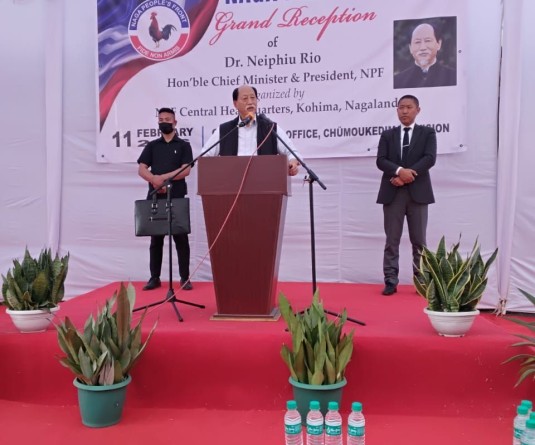
DIMAPUR, July 31 (MExN): The Department of Health and Family Welfare Nagaland today informed that recently, there is increase in cases of Dengue in Dimapur following the onset of monsoon. A press release from the department stated that without the active participation from the public the control and prevention of Dengue fever looks impossible.
The Vector Borne Disease Control Program under the Department of Health and Family Welfare observed anti-dengue month in the entire month of July, with an aim to make public aware of Dengue fever, the control measures and prevention methods.
The awareness campaign was carried out in the selected colonies and villages of endemic districts. Populations of the highly endemic district of Dimapur along with other low endemic districts like Mon, Mokokchung, Kohima and Wokha were informed and educated about Dengue fever.
Water collected in different containers in and around the houses create mosquitogenic conditions particularly the Aedes mosquito that spreads Dengue virus. The Urban Vector Borne Disease Scheme (UVBDS) staff based in Dimapur are carrying out its activities in 100 colonies, however the vector indices like Container indices, House indices, Breteau indices have still not gone down below the outbreak indication level. This indicates that the mosquito larvae are still found abundantly in and around the houses of the various colonies and particularly at Nagarjan colony, where Dengue cases were detected every now and then, the department said.
While the UVBDS and DVBO Dimapur regularly carry out fogging, it said Dengue cannot be controlled immediately because it transmits the virus to its eggs (trans-ovarian transmission) and when the egg is hatched the young Aedes mosquito come up as virus infected mosquito and start infecting the Dengue virus to healthy people when it bites them.
Therefore, it is very important that every colony/ village remove all materials in and around houses where water gets collected during rainy season, it advised.
It further informed that there are various test kits for diagnosing Dengue and are in use by different public and private health institutions. While, most of the private health institutions use Rapid Diagnosis Test Kit (RDT), according to the Government of India NCVBDC programme guidelines, any Dengue detected positive through RDT can be called as Probable Dengue and sample should be sent either to District Hospital Dimapur or NHAK for confirmation through ELISA test and if found positive then only it can be called as true Dengue positive.
Dengue is also a Notifiable Disease and every institution or clinician should immediately report to the district authority either to the CMO or DVBO.
Anti Dengue activities being carried out
• Household larval search every week particularly in Dimapur urban area and if mosquito larvae is found in any container the individual or house owner and colony is informed to to check and keep removing them in future. This is still found to be wanting from the public.
• When there is high density of larvae present in any drainage/ponds, insecticides are sprayed into those places to kill the mosquito larvae.
• Releasing Guppy fish into the water bodies where water cannot be removed or covered, so as to let them eat up all the mosquito larva that are present. The public can collect larvivorous fish and rear them in areas where water cannot be removed.
• Public are requested to use clothes that cover body properly to prevent from mosquito from bite, use mosquito repellent and sleep inside mosquito nets, while window and door wire mesh for preventing mosquito entry is also advisable.
• Public are informed that Dengue virus carrying mosquito that is, Aedes mosquito also called tiger mosquito bite during day time and mostly dawn and dusk, hence avoid mosquito bite while sitting outside.
• Tiger mosquito prefers to live with human being as it gets its meal easily.




